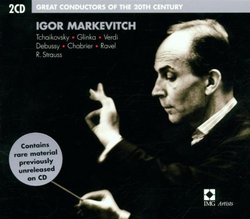| All Artists: Emmanuel Chabrier, Claude Debussy, Mikhail Glinka, Maurice Ravel, Richard Strauss, Pyotr Il'yich Tchaikovsky, Giuseppe Verdi, Igor Markevitch, L'Orchestre National de la Radiodiffusio, Lamoureux Concert Association Orchestra Title: Great Conductors of the 20th Century: Igor Markevitch Members Wishing: 0 Total Copies: 0 Label: EMI Classics Release Date: 6/4/2002 Album Type: Original recording remastered Genre: Classical Styles: Opera & Classical Vocal, Forms & Genres, Theatrical, Incidental & Program Music, Historical Periods, Modern, 20th, & 21st Century, Romantic (c.1820-1910), Symphonies Number of Discs: 2 SwapaCD Credits: 2 UPCs: 724357512428, 724357512459 |
Search - Emmanuel Chabrier, Claude Debussy, Mikhail Glinka :: Great Conductors of the 20th Century: Igor Markevitch
 | Emmanuel Chabrier, Claude Debussy, Mikhail Glinka Great Conductors of the 20th Century: Igor Markevitch Genre: Classical
|
Larger Image |
CD Details |
CD ReviewsGet it for the Manfred ! goodmusicman | USA | 08/03/2004 (5 out of 5 stars) "This 2-CD set contains the best recording of Tchaikovsky's Manfred Symphony currently available. (Why they don't market the CD this way is beyond me!)There have never been too many good recordings of this work, but Markevitch's 1963 recording with the London Symphony Orchestra is among the best ever. The entire symphony is given a propulsiveness and urgency lacking in other recordings, without getting bogged down by the emotional weight of the score. The outer movements are very exciting and intensely played, while the inner movements are balletic and colorful, without any sense of lack of cohesion as a result of the contrast. In fact, Markevitch holds this sometimes unruly symphony together better than anyone else, while coaxing truly Russian performances out of the British orchestra. Just listen to that brass roar! The sound quality is very good for the period, although not as good as Mercury's famous recordings.The only flaw is that when the organ makes its entry at the end of the last movement, the sound is just too muddled to make a strong impact, but anyway the organ isn't the strongest part of this score, and thus it shouldn't cause you any hesitation to buy this recording. The filler on this first CD is excerps from Glinka's A Life for the Tsar, very well played, giving this CD 78 minutes of great Russian music. The second CD has great recordings, but with the modest asking price it really is worth buying this CD-set just for the Manfred. Until a new digital recording is made that surpasses this one, the Markevitch Manfred is the one to own." An actually great conductor is allowed to shine Santa Fe Listener | Santa Fe, NM USA | 11/20/2005 (5 out of 5 stars) "The Great Condcutors series has had a hard time with consistency. They don't always find great conductors or match them with great performances; here they do both. Igor Markevitch was a phenomenon as a young composer favored by no less than Diaghilev. He gave up composing for conducting after WW II and was a prominent artist for DGG throughout the Fifties, conducting both the Berlin Phil. and various French orhestras, particularly the Lamoureux. Sadly, Maarkevitch suffered a drastic hearing loss on the podium around 1961 and ended his days in much reduced prominence.
Fortunately, CD 1 features an impetuous, sometimes explosive Tchaikovsky Manfred Sym. that displays all of Markevitch's dynamism and control. It's in very good 1963 stereo with the London Sym. Next come evocative excerpts from Glinka's A Life for the Czar from 1957 with the scrappy but colorful Lamoureux; fortunately the sonics, which tended to be raw and nasty from Paris, here sound agreeabbly smooth. CD 2 begins with a 1967 La Forza del Destino Over. from London--it's eerily smooth and beautifully phrased. Next comes the main work, an excellent Debussy La Mer from 1959 with the idiomatic Lamoureux. Markevitch and the engineers cooperate in a lean, very detailed reading with lots of impact--this is tangy Gallic Debussy rather than the high virtuosity of Karajan's famous version from Berlin. I like it better than the classic Ansermet, too, which has been reissued by Decca on CD in disagreeable, wiry sound. Towards the end of his career Markevitch was a gypsy, conducting provincial orchestras scattered across Europe. Spanish, French and German ensembles are featured in the last three selections here: a fizzy, prickly Chabrier Espana (1966), a live Daphnis and Chloe Suite #2 (1960) that shows off Markevitch's fine ear and sense of balance--his dry-eyed reading is gratifyingly devoid of cloying Ravel perfume--and finally, the only German work in the collection, Strauss's Till Eulenspiegel (mono, 1956), which tunrs out to be the least individual performance here and is pretty well undone by tubby radio sound. Overall, this is one of the best installments in the series, and one of the few where two performances--Manfred and La Mer--can stand up to any competition. Five stars, definitely." |

 Track Listings (8) - Disc #1
Track Listings (8) - Disc #1